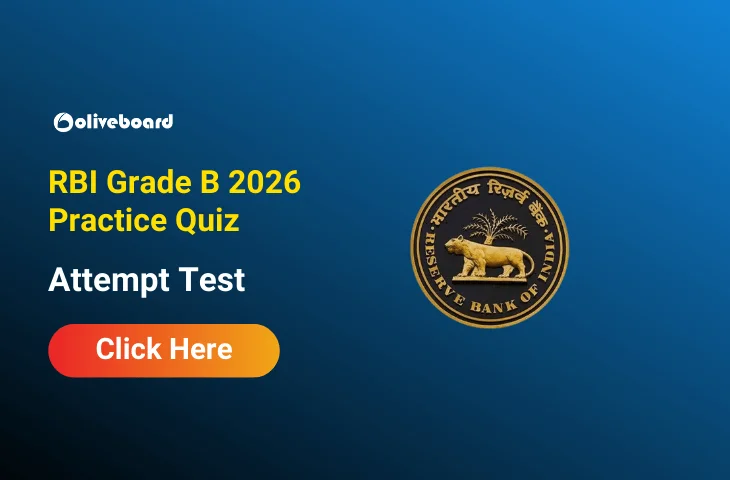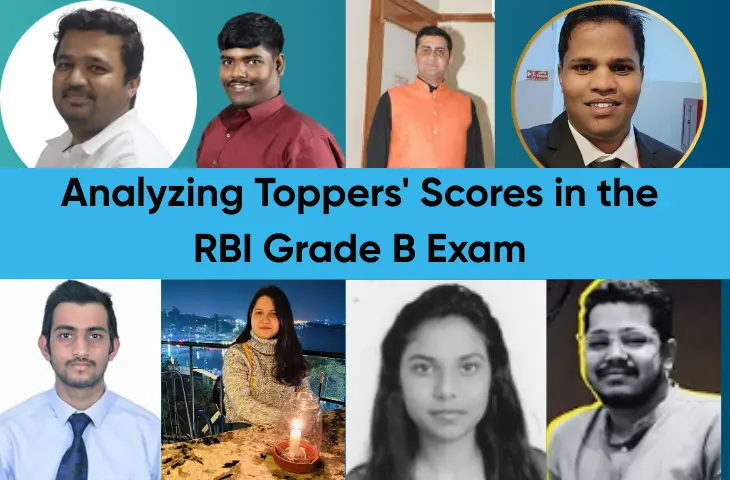The RBI Grade B exam is among the most prestigious banking exams in India. Clearing it opens doors to a highly respected career in India’s central banking system. One of the most effective ways to plan your preparation is by analysing the scores and strategies of past toppers. In this blog, we explore how toppers like Shekhar Kumar, Tanay Gaurav, Prachi Dhurandhar, and others approached the exam, along with lessons you can apply.
Understanding the RBI Grade B Exam Structure
Before diving into toppers’ strategies, it’s important to know the exam’s structure:
| Phase / Round | Subjects / Components | Type of Questions |
| Phase 1: Objective Paper | General Awareness (GA), English Language, Quantitative Aptitude, Reasoning | Multiple Choice Questions (MCQs) |
| Phase 2: Objective + Descriptive | Economic and Social Issues (ESI), Finance and Management (FM), English Descriptive Writing | MCQs + Descriptive Questions |
| Interview Round | Tests personality, communication, and understanding of the economy and financial system | Personal Interview / Viva Voce |
Why Studying Toppers’ Scores Matters?
Analysing the scores of past RBI Grade B toppers is a strategic step in exam preparation. It’s not just about knowing who scored the highest it’s about learning patterns, planning efficiently, and setting realistic goals. Here’s why this analysis is so valuable:
1. Identify High-Scoring Sections: By reviewing topper scores, aspirants can see which sections consistently contribute the most marks. For example, toppers often excel in General Awareness, Economic & Social Issues (ESI), and Finance & Management (FM). Understanding this helps candidates prioritize sections during preparation and allocate time efficiently.
2. Set Realistic Score Targets: Seeing actual topper marks gives aspirants a benchmark. Instead of aiming blindly, you can set achievable targets for each section, ensuring that your preparation is goal-oriented and focused.
3. Understand Exam Difficulty Trends: Toppers’ scores reveal trends about exam difficulty over the years. If Phase 1 scores are consistently high, it indicates a moderate level of difficulty; lower scores may signal tougher questions. This insight helps adjust study strategy accordingly.
4. Plan Time Allocation: Knowing which sections toppers found easy or challenging allows aspirants to plan their study schedule effectively. For example, if most toppers scored exceptionally in GA but found Quantitative Aptitude tricky, you can dedicate more practice time to aptitude while maintaining GA prep.
5. Learn Effective Exam Strategies: Beyond numbers, studying toppers’ preparation techniques like daily mock tests, time management, revision strategies, and answer-writing skills provides practical guidance. This helps aspirants avoid trial-and-error approaches and study smartly.
6. Build Confidence & Motivation: Seeing how real candidates succeeded can be highly motivating. It proves that top scores are achievable with disciplined preparation, helping aspirants stay committed during long study periods.
7. Reduce Preparation Mistakes: Analysing toppers’ scores and patterns also helps identify common pitfalls. For instance, sections with high scoring potential are often ignored by aspirants, or time-consuming questions in Quantitative Aptitude are attempted without strategy. Learning from toppers reduces such avoidable mistakes.
Toppers’ Score Analysis
Looking at the overall scores of RBI Grade B toppers helps aspirants understand what it takes to achieve top ranks. It shows the marks needed to clear each phase and gives a realistic benchmark for preparation. Analysing these scores also helps identify trends in exam difficulty and how toppers managed their time and strategy.
| Candidate | Phase 1 Score | Phase 2 Score | Interview Score | Total Score |
| Shekhar Kumar | 180/200 | 270/300 | 80/100 | 530/600 |
| Tanay Gaurav | 190/200 | 280/300 | 85/100 | 555/600 |
| Prachi Dhurandhar | 188/200 | 278/300 | 83/100 | 549/600 |
| Gorakh Jayswal | 185/200 | 275/300 | 82/100 | 542/600 |
Shekhar Kumar’s Strategy
Shekhar Kumar secured AIR 8 in the 2024 RBI Grade B exam. He attributes his success to a structured approach inspired by Tanay Gaurav, AIR 1. His preparation involved consistent study routines, regular mock tests, and focused revision sessions. Shekhar emphasized the importance of mentorship and guidance in navigating the complexities of the exam.
Tanay Gaurav’s Strategy
Tanay Gaurav achieved AIR 1 in the 2024 RBI Grade B exam. His disciplined approach included a well-planned study schedule, extensive reading of economic surveys, and regular practice through mock tests. He also highlighted the significance of staying updated with current affairs and maintaining a balanced lifestyle to manage stress.
Hardik Mehta’s Strategy
Hardik Mehta secured AIR 1 in the 2016 RBI Grade B exam. His strategy focused on understanding the exam pattern, prioritizing high-weightage topics, and practicing previous years’ papers. He also emphasized the importance of time management and staying calm during the examination.
Prachi Dhurandhar’s Strategy
Prachi Dhurandhar topped the RBI Grade B 2023 exam. She relied on her experience from the SBI PO exam for Phase 1 preparation. For General Awareness, she utilized video resources to cover government schemes and PIBs, often at 2x speed, to save time. She also extensively used Oliveboard’s mock tests for practice.
Gorakh Jayswal’s Strategy
Gorakh Jayswal, the RBI Grade B 2023 topper, focused on mastering the Finance and Management section, which he found challenging. He utilized Oliveboard’s mock tests and sectional tests to build confidence and improve his performance. His strategy included consistent practice and revision to strengthen his weak areas.
Diksha Shinde’s Strategy
Diksha Shinde, an engineer from Chhattisgarh, cleared the RBI Grade B 2023 exam after preparing for UPSC and working as a Probationary Officer in a public sector bank. Her strategy involved understanding the exam pattern, focusing on key subjects, and consistent practice. She emphasized the importance of self-assessment and adapting strategies based on performance.
Samyak Bhandari’s Strategy
Samyak Bhandari secured AIR 10 in the 2022 RBI Grade B exam. He believed in a balanced approach, focusing on both Phase 1 and Phase 2 preparations. His strategy included regular mock tests, analyzing mistakes, and practicing descriptive English writing on a subpar keyboard to simulate exam conditions.
Aviral Agrawal’s Strategy
Aviral Agrawal cleared the RBI Grade B 2023 exam in his fourth attempt. His strategy involved persistent effort, learning from previous attempts, and focusing on weak areas. He utilized resources from various coaching platforms and maintained a disciplined study schedule to achieve his goal.
Subject-Wise Insights
Breaking down toppers’ scores subject by subject gives a clear picture of which areas carry more weight and which need extra focus. By seeing how toppers performed in General Awareness, ESI, FM, English, Quantitative Aptitude, and Reasoning, aspirants can prioritize subjects, plan study time better, and aim for a balanced performance across all sections.
General Awareness
Toppers dedicate daily time to financial news, RBI circulars, and economic events. Consistency in current affairs is crucial.
Quantitative Aptitude & Reasoning
Speed and accuracy are key. Toppers recommend daily practice of 50–100 questions and focus on shortcuts for calculation-intensive topics.
Economic & Social Issues (ESI)
Understanding macroeconomic trends, government schemes, and RBI policies is vital. Toppers advise using notes from credible sources and solving past papers.
Finance & Management (FM)
Top scorers focus on financial regulations, banking policies, and corporate finance concepts. Regular revision and case studies enhance understanding.
Descriptive Writing
Clarity, structure, and relevant examples make the difference. Toppers structure answers with headings, bullet points, and concise explanations.
How to Apply Toppers’ Strategy
Simply knowing toppers’ strategies is not enough; aspirants must adapt and personalize them. Here’s how:
- Create a Study Plan Inspired by Toppers – Break down subjects weekly, allocate time based on personal strengths and weaknesses, and include daily revision and current affairs updates.
- Practice Mock Tests Strategically – Take regular tests under exam conditions. After each test, analyse performance, identify weak areas, and revise accordingly.
- Set Realistic Targets – Use topper scores as benchmarks. Aim to reach those marks section-wise rather than focusing solely on total score. This reduces stress and provides clear goals.
- Focus on Conceptual Learning – Instead of memorizing, understand concepts, frameworks, and formulas. Apply them in mock tests and practice questions for better retention.
- Adapt Time Management Techniques – Observe how toppers divide their time in each phase and customize a strategy that suits your speed and accuracy. Prioritize sections that carry more weight or that you are strong in.
- Stay Consistent and Motivated – Topper strategies emphasize daily consistency, perseverance, and discipline. Following a routine helps maintain momentum, even during challenging phases of preparation.
FAQs
A1. Analysing toppers’ scores helps you identify high-scoring sections, set realistic targets, understand exam difficulty trends, and learn effective preparation strategies.
A2. You can adapt their strategies by creating a study plan, practicing mock tests, focusing on weak areas, learning concepts thoroughly, and managing time efficiently.
A3. Toppers often score high in General Awareness, Economic & Social Issues (ESI), Finance & Management (FM), and English. Consistency and focused practice in these areas are key.
A4. Topper scores vary, but Phase 1 scores often range between 180–190/200, Phase 2 between 270–280/300, and interview scores between 80–85/100.
A5. Yes. Mock tests simulate exam conditions, help track performance, identify weak areas, improve speed and accuracy, and boost confidence.
- SEBI IT Officer Syllabus 2026, Exam Pattern, Download PDF

- SEBI Law Officer Recruitment 2026, Download Notification PDF

- SEBI IT Officer Recruitment 2026 Notification, Download PDF

- SEBI Legal Officer Syllabus 2026 & Exam Pattern, Download PDF

- ESI & ARD Practice Questions for NABARD Grade A 2026

- RBI Grade B 2026 Practice Quiz, Download Free PDF


Priti Palit, is an accomplished edtech writer with 4+ years of experience in Regulatory Exams and other multiple government exams. With a passion for education and a keen eye for detail, she has contributed significantly to the field of online learning. Priti’s expertise and dedication continue to empower aspiring individuals in their pursuit of success in government examinations.
